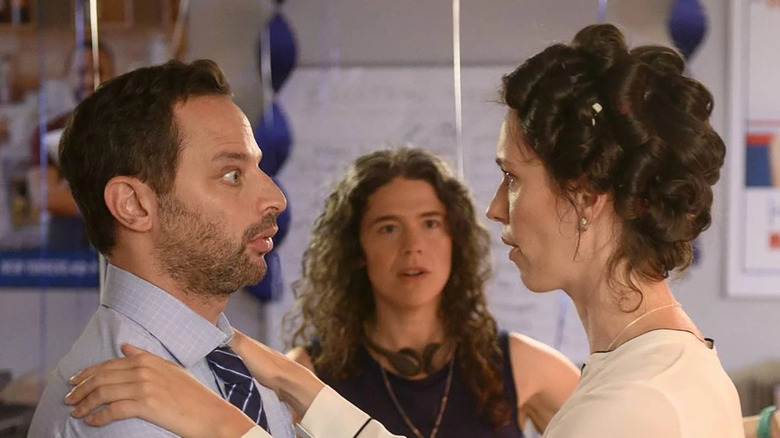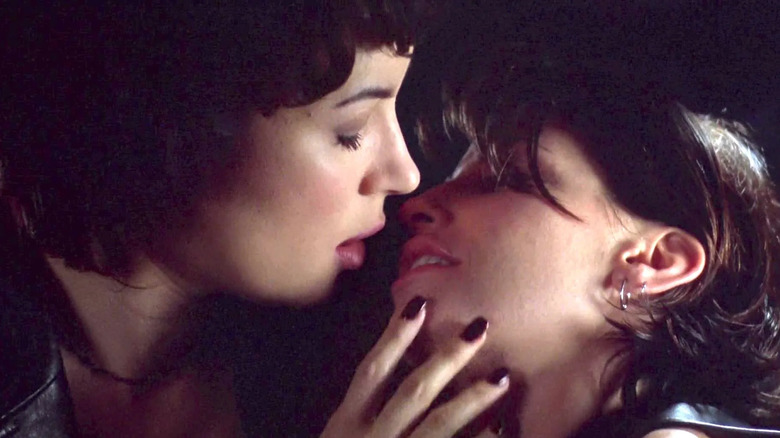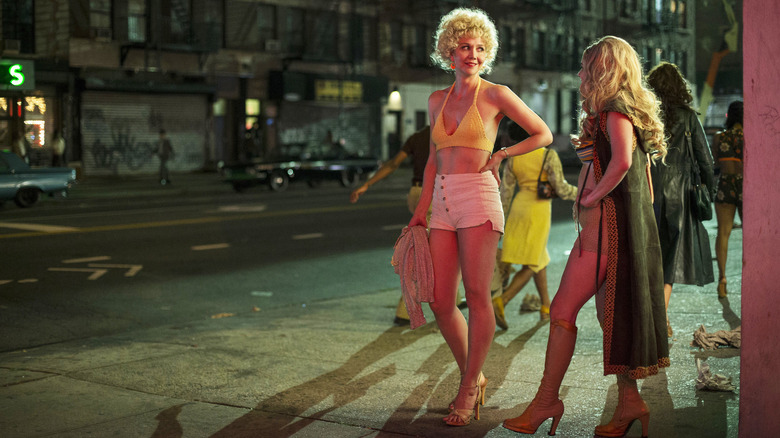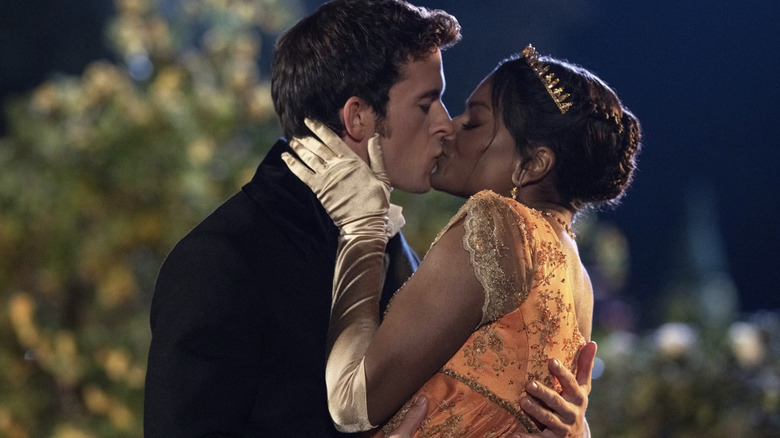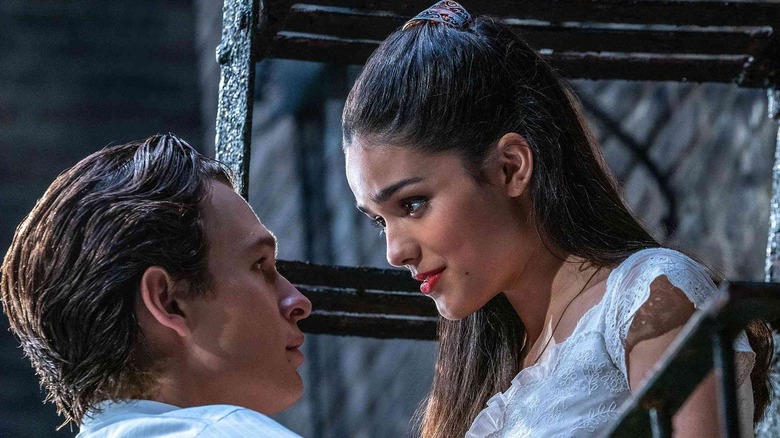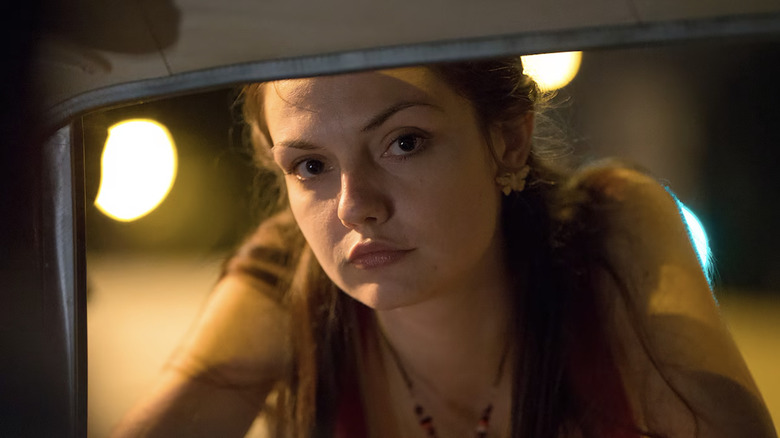What Does An Intimacy Coordinator Do? Dispelling The Myths Of A Vital Production Role
During this year's Variety's Actors on Actors series, Academy Award-nominee Mikey Madison confessed to "The Last Showgirl" star Pamela Anderson (a woman with a history of having been exploited by the fame machine) that she had declined to use an intimacy coordinator for "Anora," despite the explicit nature of the film and her character. This situation kicked up a flurry of discourse, with multiple intimacy coordinators speaking with Variety to weigh in on the situation. To be clear, Madison said that the "sex shots" in "Anora" were "a very positive experience" for her. However, the water-cooler conversations that followed showed that the general public still doesn't fully understand what it is that an intimacy coordinator does.
In the wake of Hollywood mega-producer Harvey Weinstein's long overdue reckoning for his history of sexually harassing, abusing, and intimidating women, there was an upswing in conversations about the systemic issue of on-set safety. As the #MeToo movement grew, so did the number of people speaking out about the history of sexual misconduct on film and television sets across the decades. Something needed to change, and it needed to change now.
In 2017, movement director and intimacy coordinator Ita O'Brien introduced the "Intimacy On Set Guidelines," and multiple organizations were created to help train and certify people to work in the role. Toward the end of that same year, "The Deuce" star Emily Meade demanded that HBO hire an intimacy coordinator for her sex scenes on the show, and it inspired the network to set a standard that all productions will now have an intimacy coordinator moving forward.
For the purposes of this article, I spoke with two intimacy coordinators. One of them, Amy Waller, has appeared as an actor on shows like "911," "Runaways," and "The Wretched," and served as an intimacy coordinator on projects like "Guys Like You," "Pickleback," and "Ethixxx of Desire." I also spoke with Claire Warden, the intimacy director and coordinator on "Three Women," "Gossip Girl," "Mrs. Fletcher," and Steven Spielberg's "West Side Story." At the time of our interview, Warden was actively serving as the intimacy director on "Romeo and Juliet" with Rachel Zegler and Kit Connor on Broadway.
Intimacy coordinators have been a part of live theater for a while now, but Hollywood, as is often the case, was woefully behind in this area until pretty recently. The guidelines for filming nudity and sex scenes were created with individuals that included Alicia Rodis and Warden. After the COVID-19 lockdowns, SAG-AFTRA released guidelines for working with intimacy coordinators and aligned with multiple organizations, including Intimacy Directors and Coordinators (IDC), to begin standardizing it in the industry.
In short, there is so much more to intimacy coordination than what "The Idol" treated like a huge joke. Consider this an audience introduction to this vital production role, and how intimacy coordination is making sets better.
How do we define intimacy?
Similar to dance choreographers or fight choreographers, an intimacy coordinator choreographs and oversees scenes featuring intimacy, nudity, and simulated sex between performers. As a coordinator, they also facilitate the conversations between directors, performers, wardrobe departments, and production. Additionally, they serve as advocates for the performers or other team members, helping to find solutions to any issues that may arise. They're there to amplify the actors' voices and concerns, facilitate the establishment of consent, and find the pathway to guarantee the project is respectful of any and all boundaries set by performers while still maintaining the vision of the production.
Before the role of the intimacy coordinator was established, these scenes were typically crafted by either a choreographer or a director. And while there are undoubtedly empathetic, caring, and considerate people who have controlled these scenes in the past, there have been plenty who were in no way qualified to handle such sensitive scenes. (For more on that, see the "Last Tango in Paris" controversy.) But there have also been people trying to hold consent in a process in some form until now. Notably, the Wachowskis hired sex educator Susie Bright when they were making "Bound" and had her serve as a "technical consultant" and choreographer for the intimate scenes. (I previously interviewed Gina Gershon about this experience on the /Film Daily podcast.)
"What comes under my purview is any kind of nudity or hyper exposure, and by hyper exposure I mean uncovering an area of a body that that person would normally keep covered if they were at a beach or a pool for example," Claire Warden tells me. "Because it's not always just breast, buttocks, and genitals — for someone it might be cultural or religious reasons — but also any kind of simulated sex or sexually motivated touching, any kind of what I call intense physical or intense intimate physical contact."
This goes far beyond sexuality. It could also include scenes like medical exams, being a corpse on the slab during an autopsy, the act of helping someone bathe, or even just special effects being set off near an intimate region. "I think intimacy is a very broad term, for me, it is a deep body and soul-centered connection — that it's the inside human reaching out to the inside human," Warden says.
For Amy Waller, she describes intimacy in a broad sense as "closeness, vulnerability, exposure, connection [...] sharing a part of yourself, whether that be mind, body, spirit, or even a space that is private and only shared with those you choose to share it with to feel a sense of closeness."
What draws people to become intimacy coordinators?
Amy Waller first learned about intimacy coordinators while acting on a TV series in New Zealand, and was immediately drawn to the role as someone with a performance and dance background. "I thought, 'Wow, if only I had, had someone there to advocate for me on set during my intimate scenes, especially in my 20s when I hadn't quite found my voice,' [because] I was terrified back then to say anything out of fear of getting fired or losing future work," Waller says. She also remembers asking her scene partners if they could quickly block out scenes before the director called action.
"In most cases, my fellow actors and I would just be thrown into these intimate scenes with minimal or zero guidance," she says. "In some cases, make-up artists would step in making sure we felt safe but I remember thinking ... this isn't really supposed to be their job but they were usually the only women on set so naturally were 'assigned' the caregiver role." Unfortunately, she also remembers times where sets were said to be "closed," only for extras and crew to appear and the "closed set" would suddenly become a set of 50 people. (For those unaware, a closed set is when production is restricted to essential personnel, typically for scenes that require privacy, confidentiality, or safety.)
As for Claire Warden, she is one of the foundational members of the intimacy coordination industry and helped codify the discipline. She first heard about Tonia Sina, author of "Intimate Encounters; Staging Intimacy and Sensuality," following her work on "The Bacchae" at Stratford Shakespeare Festival. She reached out looking to get involved. This led her to join forces with trailblazers like Alicia Rodis (the aforementioned intimacy coordinator from "The Deuce") and Siobhan Richardson, two people whom Sina had gotten together to create Intimacy Directors International, which is what first codified the movement.
"It's one thing to create an entirely new discipline and approach, It's another thing to bring it to an industry that doesn't want to change or that has sat in a lot of harm and how to bring a solution to that harm," Warden says. She also brought along not just a background in acting and choreography but also "teaching actors and working with actors, specifically those with trauma, in how to metabolize their trauma to release themselves and their bodies back to their art in a way."
In 2020, Warden began designing the curriculum to teach the work of becoming an intimacy coordinator in an ethical, responsible, and integral way for other people who want to also do the work. "I'm a bit of warrior, so I was the one that was kicking down the doors and being like, 'Things must change,'" Warden tells me. "Bringing that kind of energy to it and being in that position of speaking truth to power in a way that could both respect but also hold accountable power."
When do intimacy coordinators get brought onto a project?
As a relatively new role in film production, there has yet to be a set standard for when an intimacy coordinator is brought into a production. "In an ideal world, we would come on the team as early as the director of photography or any other head of department," says Waller. "Unfortunately, that is not always the case, but the earlier the better!" SAG-AFTRA rules require at least a 48-hour notice for an actor to receive their riders before shooting a simulated sex scene or scene that involves nudity. Still, the intimacy coordinator needs time to facilitate consent-based conversations, help draft the language for any nudity riders, get approval of the language from the actor, and share all of the information with the legal department. They also need time to ensure all protection protocols are in place, modesty garments are available, have time for rehearsal, and make any necessary changes.
Once production is underway, both Warden and Waller recommend filming the scenes at the top of the day so that no one feels rushed or pressured into doing something they might not be comfortable with just to "make the day." This further ensures that no one is exhausted from having worked all day, and it can also be a great way to set the tone. In addition, it's highly recommended that scenes are built into the schedule for main or recurring performers after they've had a chance to get to know one another a little better and figure out how they function as scene partners outside of intimate settings. "It also allows the crew to get to know each other, and how the flow of the set goes, and how everyone is. Everyone settles in, then we can dig into something that might feel a little safer for everybody," Warden says. However, this is obviously very different for projects where scenes of intimacy are centered on day players.
I joked that with day players, it might feel like an icebreaker activity, but Warden says that it often very much is like that. "It's literally like, 'Hello, lovely to meet you. My name's Claire. Great. We are going to take off our clothes and pretend to have sex now.' Sometimes, that's how it is. So that's when the intimacy coordinator can do a lot of work to help bridge that and to help build the information and the trust between those actors."
And it's much easier for those conversations to be had if the intimacy coordinator is brought in as early as possible. "The ideal is, and what I would like everybody to know, what we're trying to encourage the industry to understand, is that in pre-production, when you bring any other member of your crew on, bring the intimacy coordinator on because we have a lot of pre-production or pre-shoot prep to do, we have a lot of conversations," Warden adds.
What are the building blocks of a safe, functioning set?
Hiring an intimacy coordinator is vital to guaranteeing a set is a secure place for all involved when it comes to intimate scenes. However, as for what actually goes into making that set a place where actors have agency, both Warden and Waller emphasized clear and effective communication, consent, and prioritizing the human beings creating the art above all else. "Consent is considered, reversible, informed, specific, and participatory so an actor has the fundamental right to reverse their consent at any stage of the production," Waller explains. She continues:
"Part of my job is to liaise with the director, producer, and other production heads so I obtain as much information ahead of time and have all of the necessary conversations so we hopefully don't end up with surprises on the day. Part of my job is also to look for any warning signs or signs that an actor isn't feeling confident in doing what is requested of them so we can make any necessary changes or adjustments ahead of time."
Warden acknowledges that sometimes in film in television, there is something known as "information hoarding," typically so that plot details or creative decisions aren't leaked to the public. Unfortunately, information hoarding can prevent consent from being informed consent. "We work against a great deal of urgency in the industry because we never seem to have enough time to shoot all the things, and when you run out of time, the first thing that happens is that we get a lot of urgency and a lot of rushing through, and urgency is a tool of coercion," Warden says.
Establishing clear protocols across the entire set helps to keep a production on track. If everyone at every stage of production knows the protocols, it's much easier to uphold the actor's consent. Production teams are already used to these types of protocols when working with stunts or animals, so it's all about applying a similar standard for scenes of intimacy.
"And on the softer side, it's a willingness to invest in really seeing these actors as humans with rights and needs and kind of an undoing of the conditioning that we've all had in the film industry that requests boundaries and agency are things that are annoying and get in the way," Warden says. "An ability to honor the humans we work with and get creative, really invest in the creativity of the stories we're telling."
Intimacy coordinators make for better performances
There are, unfortunately, countless stories of performers discussing how their on-set discomfort (or worse, assault) has caused immense trauma, and having an intimacy coordinator could have prevented that. The genuine protection of human beings who make art should, of course, be at the forefront, but what is often left out of discussions surrounding intimacy coordination is how their presence allows for better overall productions. When an actor knows that they have agency and the time to actually consider what they want to be seen and done to their bodies, they don't have to spend time on high alert or processing a fearful situation. "They're fully grown adults that can make decisions about their creative work and when we respect them as humans and we give them agency, they give such beautiful, bold, powerful performances," Warden says.
Actors are people, and people have complex thought processes and feelings. "Chemistry can be created through technique," Waller explains. "If the scene isn't reading, usually I will be able to see why and then I will ask if I can make a suggestion or technical adjustment. If any disputes happen — the 1st AD and the producers need to make sure these aren't escalated on set — especially while the actors are in a hyper-exposed situation." If everyone on set can get together on the same page, more attention can be paid to performances and, ultimately, a better final product.
At the time of our discussion, Warden had just worked on "Three Women," the Starz series based on Lisa Taddeo's bestselling non-fiction book. "The scenes in that are so emotionally rich and powerful and vulnerable because the actors were given a space where they felt really cared for, respected, and that they were in control, and so they could really do the fun, risky, powerful, scary work," she tells me. "I think that's what it's about, really ensuring that we set them up optimally to do the best work they can in a way that doesn't take from them or harm them in any way."
